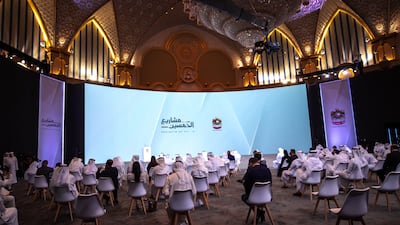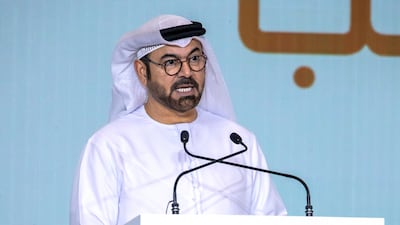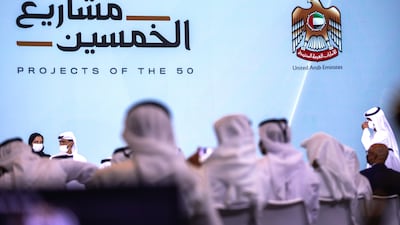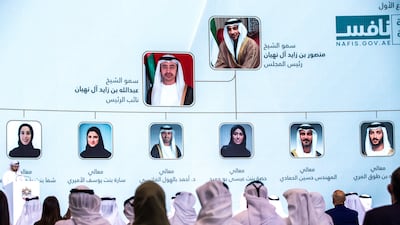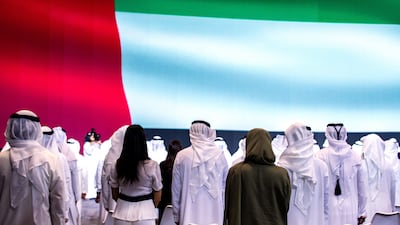Latest: Employers must offer jobs with 'real career growth' to attract Emiratis, say recruiters
A series of major projects to boost the UAE's economy and development were revealed on Sunday.
At Qasr Al Watan, the Presidential Palace in Abu Dhabi, ministers set out the latest 13 items in the 'Projects of the 50' plan.
These relate to boosting the country's human capital and increasing the number of Emiratis employed in the private sector.
All private sector companies in the UAE should have a workforce that is at least 10 per cent Emirati in five years' time.
Sheikh Mansour bin Zayed, Deputy Prime Minister and Minister of Presidential Affairs, and Mohammed Al Gergawi, Minister of Cabinet Affairs, were present as the new projects were revealed.
Financial incentives for Emiratis in the private sector
One of the first to be announced was a plan to spend up to Dh24 billion ($6.53bn) on getting 75,000 Emiratis into private sector jobs, Mr Al Gergawi said.
UAE citizens will be offered a series of incentives to choose private sector work.
University graduates will be encouraged to take up jobs in the private sector, with the government offering to boost their salary to make the decision more attractive.
For example, the government will top up an Emirati graduate's private sector salary by Dh5,000 a month, and make support payments for his or her children.
A separate plan will allow federal government employees to take a sabbatical on 50 per cent of their salary to start a business. Another will provide financial grants to encourage Emiratis over the age of 50 who take early retirement to start a businesses.
The 13 latest projects
1) Emirati Talent Competitiveness Council: With Sheikh Mansour bin Zayed as chairman and Sheikh Abdullah bin Zayed, Minister of Foreign Affairs and International Co-operation, as vice chairman, the council brings together representatives across federal government. It is tasked with strengthening private sector partnerships and implementing projects to provide 75,000 private sector jobs for Emiratis.
2) Emirati Salary Support Scheme: A grant contributing to the recruitment and training costs of Emirati graduates in the private sector, with a monthly top-up of up to Dh8,000 for graduates during the first year of training and a monthly top-up of up to Dh5,000 for five years after recruitment. Top-ups are conditional and based on a range of defined target salaries.
3) Merit Programme: A fixed monthly salary top-up of Dh5,000 to be provided for five years to Emirati workers in specialised fields, including nursing, accountancy and financial auditing, also lawyers, financial analysts and coders.
4) Pension Programme: A five-year subsidy against the pension plan contributions of Emirati staff earning less than Dh20,000 per month. And a government-paid contribution on behalf of the company against the cost of pension plans for Emirati staff in the first five years, which ensures zero contributions to the cost of Emiratis' pensions in the first year of private sector employment.
5) Child Allowance Scheme: A government child allowance payment will be made to Emirati staff working in the private sector of up to Dh800 per child, up to a maximum of Dh3,200 per month, to help with the costs of childcare. It will last up to the age of 21.
6) Talent Programme: An investment of Dh1.25 billion in developing specialised vocational skills for Emiratis, with internationally recognised certifications in property management, accounting, business management and technology skills.
7) Apprentice Programme: A train-to-hire initiative to build vocational training for Emiratis in private and semi-private companies with a range of financial awards across a number of business sectors.
8) Recruitment Targets: Every private sector company in UAE must ensure 10 per cent of its workforce is Emirati within five years. The figure should rise by 2 per cent each year until 10 per cent is reached, and the jobs given to UAE nationals should be in knowledge and skilled roles.
9) National Healthcare Programme: An educational grant programme targeting the development of 10,000 Emirati healthcare workers within the coming five years. This will involve rolling out a Graduate Healthcare Assistant Programme: a Higher Diploma in Emergency Medicine and a Bachelor's degree in Nursing. Supported and led by Fatima College of Health Sciences and ACTVET.
10) Unemployment Benefit: An unemployment benefit to be paid to Emiratis working in the private sector who lose their jobs because of circumstances beyond their control, giving them a six-month period to find another position.
11) Start-up Break: Beginning 2021, a subsidised career break of six-to-12 months for Emiratis in federal government positions to start a business. Employees would receive 50 per cent of their salary while away. Will be open to a limited number of staff each year with employer approval.
12) Early Retirement: An opportunity for Emiratis in federal government positions to take early retirement in order to explore business opportunities and start a private sector business. Will include financing of five years' salary payments or a lump sum golden handshake payment. Will be open to a limited number of staff each year, with employer approval.
13) Graduate Fund: A Dh1 billion fund, under the patronage of Sheikh Mansour bin Zayed, to provide micro-loans for university and fresh graduates to support their business projects, in collaboration with UAE universities.
Sheikh Mohammed bin Rashid: 'The future is in the private sector'
Sheikh Mohammed bin Rashid, Vice President and Ruler of Dubai, said: "Today, we have clear and supported targets for the percentage of citizens in the private sector. The future is in the private sector."
He said the private sector will be partners in the country's march forward, adding: "The next 50 [years] will be better and more beautiful."
In a tweet, Sheikh Mohamed bin Zayed, Crown Prince of Abu Dhabi and Deputy Supreme Commander of the Armed Forces, said the plans would empower the country's young people.
"Consistent with our ambitions to empower our people and enhance the strength and sustainability of our economy, the UAE is launching a dedicated plan to boost the employment of UAE nationals in the private sector, which will play a vital role in our nation’s long-term development," he wrote.
The 50 national projects plan was unveiled before the UAE's 50th National Day, which will take place on December 2.
The first 13 initiatives included visas for freelancers, highly skilled professionals, investors, entrepreneurs, top students and graduates to sponsor themselves.
Flexible visas will allow people to sponsor their children into their mid-20s. There will be a visa residency grace period of up to 180 days if people lose or change their job, and new work permits will allow children aged 15 and over to get a part-time job.
These initiatives will be the cornerstone of growth as the country marks 50 years since unification.
50 Projects plan unveiled - in pictures
The first 13 initiatives announced last week included:
- Dh5bn from Emirates Development Bank for Project 5Bn to support Emirati initiatives in priority sectors, stimulate industry and contribute towards economic diversification.
- A green visa to enable highly skilled professionals, investors, entrepreneurs, top students and graduates to sponsor themselves.
- A freelancer's visa, the first federal visa for self-employed people.
- Dh5bn, also in partnership with Emirates Development Bank, for Tech Drive to support advanced technology adoption over five years.
- The 10x10 programme with the aim of achieving a 10 per cent annual increase in UAE exports to 10 global markets: China, the UK, Netherlands, Italy, Russia, Poland, Luxembourg, Australia, New Zealand and Indonesia.
- Invest.ae, a portal that unites investment-related local entities and 14 economic entities, presenting investment opportunities throughout the UAE. The website will provide resources for businesses and for opening bank accounts.
- The In-country Value programme to redirect 42 per cent of procurement of the federal government and major UAE companies to local products and services. It aims to increase the number of local suppliers from 5,000 to 7,300 and boost procurement value from Dh33bn to Dh55bn over four years.
- The Emirates Investment Summit, to be held next spring, to connect investment funds with the public and private sectors to create investment opportunities that attract Dh550bn of inward foreign direct investment to the UAE over the next nine years.
- The Fourth Industrial Revolution Network to grow 500 national companies through the application of advanced technology over five years.
- Under Global Economic Partnerships, the UAE will undertake comprehensive economic agreements with eight strategic global markets to achieve a Dh40bn annual increase in the current Dh257bn trade volume with these markets. A Higher Committee for Economic Agreements has also been established.
- The 100 Coders Every Day initiative to increase the number of coders from 64,000 to 100,000 in a year and support the establishment of programming companies through incentives and benefits.
- The UAE Data Law, the first federal law to be drafted in partnership with major technology companies. It will empower people to control how their personal data is used, stored and shared. The project is intended to protect privacy.
- The biggest programming summit in the Middle East, PyCon MEA, to be held next summer. The aim is to connect coders with the public and private sectors, and to develop digital talent and creative programming projects.
